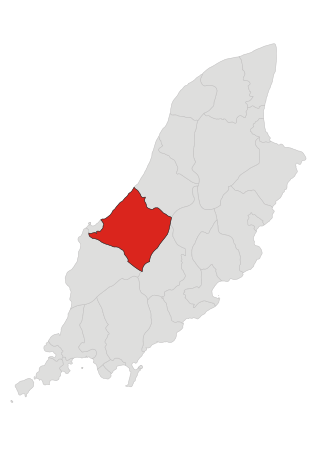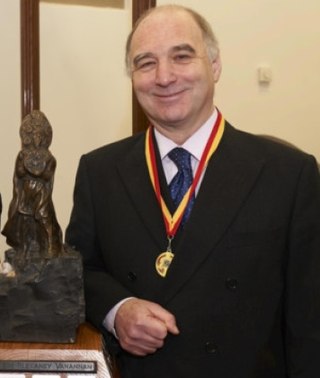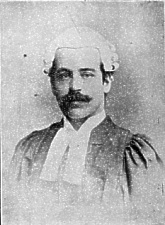
The government of the Isle of Man is a parliamentary representative democracy. The Monarch of the United Kingdom is also the head of state of the Isle of Man, and generally referred to as "The King, Lord of Mann". Legislation of the Isle of Man defines "the Crown in right of the Isle of Man" as separate from the "Crown in right of the United Kingdom". His representative on the island is the Lieutenant Governor of the Isle of Man, but his role is mostly ceremonial, though he does have the power to grant Royal Assent.

Tynwald, or more formally, the High Court of Tynwald or Tynwald Court, is the legislature of the Isle of Man. It consists of two chambers, known as the branches of Tynwald: the directly elected House of Keys and the indirectly chosen Legislative Council. When the two chambers sit together, they become "Tynwald Court".

The Legislative Council is the upper chamber of Tynwald, the legislature of the Isle of Man. The abbreviation "LegCo" is often used.

Tynwald Day is the National Day of the Isle of Man, usually observed on 5 July.

Peel is a seaside town and small fishing port in the Isle of Man, in the historic parish of German but administered separately. Peel is the third largest town in the Island after Douglas and Ramsey but the fourth largest settlement, as Onchan has the second largest population but is classified as a village.
St John's is a small village in the sheading of Glenfaba in the Isle of Man, in the Island's central valley. It is in the House of Keys constituency of Glenfaba & Peel, which elects two MHKs.

The following state officials are some of the most important in the Isle of Man. They take place in the annual Tynwald Day procession and have precedence or importance at other occasions.

A Deemster is a judge in the Isle of Man. The High Court of Justice of the Isle of Man is presided over by a deemster or, in the case of the appeal division of that court, a deemster and the Judge of Appeal. The deemsters also promulgate the Laws on Tynwald Day by reading out brief summaries of them in English and Manx.

The lowest courts in the Isle of Man are the summary courts, Coroner of Inquests, Licensing Court, Land Court, etc. These courts are presided over by magistrates. There are two stipendiary magistrates, the High Bailiff and the Deputy High Bailiff, along with lay justices of the peace.

Glenfaba is one of the six sheadings of the Isle of Man.

German is one of the seventeen historic parishes of the Isle of Man.

Thomas Brian Stowell, also known as Brian Mac Stoyll, was a Manx radio personality, Celticist, physicist, and author. He was formerly Yn Lhaihder to the Parliament of the Isle of Man, Tynwald. He is considered one of the primary people behind the revival of the Manx language.

The following outline is provided as an overview of and topical guide to the Isle of Man:
The War Consultative Committee was a body set up by the Lieutenant Governor of the Isle of Man William Leveson-Gower, 4th Earl Granville in November 1939, and which functioned as a 'war cabinet' of sorts on the island during the Second World War. For Granville, the function of the War Consultative Committee would be to provide advice to him on the legislation, policy and the daily affairs of the island. The Committee had no specific constitutional status.

Robert Corteen Carswell RBV is a Manx language and culture activist, writer and radio presenter. In 2013 he received the Manx Heritage Foundation's Reih Bleeaney Vanannan award for outstanding contributions to Manx culture.
The Royal Manx Fencibles was a fencible regiment of the British Army which was raised in the Isle of Man. Its duties included home defence, but it performed various tasks away from the Isle of Man, and was in Ireland at the time of the 1798 Rebellion.

Stewart Stevenson Moore QC was a Manx lawyer, who was the First Deemster and Clerk of the Rolls on the Isle of Man.
Doug Fargher (1926–1987) also known as Doolish y Karagher or Yn Breagagh, was a Manx language activist, author, and radio personality who was involved with the revival of the Manx language on the Isle of Man in the 20th century. He is best known for his English-Manx Dictionary (1979), the first modern dictionary for the Manx language. Fargher was involved in the promotion of Manx language, culture and nationalist politics throughout his life.
Charles Craine (1911-1979) also known as Chalse y Craayne, was a Manx language activist and teacher who was involved with the revival of the Manx language on the Isle of Man in the 20th century.
John William Radcliffe, more commonly known as Bill Radcliffe, or also Illiam y Radlagh, was a Manx language activist, author, and teacher who was involved with the revival of the Manx language on the Isle of Man in the 20th century. His work recording the last native speakers of the language with the Irish Folklore Commission helped to ensure that a spoken record of the Manx language survived.









